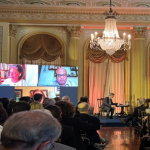The G20 today is undoubtedly the most significant grouping of major world economies, and one which can make a significant impact on world affairs. This is particularly true, as the role of the United Nations is seen to be declining, and ineffective. Now that the UN agenda, especially in terms of Sustainable Development Goals (SDGs), has been passed on to the G20, the grouping has become even more relevant.
The Indian Presidency has come at a critical juncture: post-Covid era, with the on-going Russia-Ukraine conflict, changing US-China relations, and a global economic slowdown. India has been walking a fine line between these co-related tensions and focusing on those issues that are critical to breaking through deadlocks. These include global collaboration on vaccine research, development, and delivery; debt distress forgiveness, especially from China and the Debt Service Suspension Initiative for Less Developed Countries; digital public infrastructure, which is a replicable model from India; investment in resilient and inclusive global supply chains; and reform of multilateral institutions.
Regionally, India’s G20 is viewed as an opportunity for other south Asian countries to observe the proceedings and understand the workings of a club they are normally kept out of. So, Bangladesh has been an important guest, and President Sheikh Hasina will be a part of the upcoming Leaders’ Summit next week. Countries like Sri Lanka and Bangladesh view India’s active engagement as beneficial to the neighbourhood, as the creation of new supply chains will surely involve them, bringing them new opportunities.
Here, India’s digital public infrastructure initiative, included in the Finance Ministers and Central Bank Governor’s track under financial inclusion, has helped to familiarise the process in our neighbourhood, and this year, some parts of it, like the United Payments Interface, have already been adopted by Bangladesh, Nepal, Sri Lanka, Bhutan, and in India’s near neighbours like Singapore, the UAE, and Oman.
This is a particular example of how India’s ideas and impressions on the global agenda can be translated into action in the neighbourhood.
More broadly, India’s G20 year is fulfilling its goal of amplifying the voice of the global south. This is apt, particularly as the G20, for the first time, has four developing countries taking on the presidency successively: Indonesia in 2022, India later this year, Brazil later this year, and South Africa in 2025.
This unique, never-before-seen combination is the antithesis of fragmentation. In fact, it is a group with the most in common—internal cohesion and development—and a global common cause, similarly encapsulated. For instance, all three countries aspire to the most important multilateral body, the UN Security Council. The presidencies of India, Brazil, and South Africa will work hard to open these closed doors and will surely prioritise this goal.
There has been much discussion on the reform of the Multilateral Development Banks as well as strengthening them. India has initiated the G20 Independent Expert Group Report on Strengthening MDBs.
Some of these efforts may not be as necessary through the next two presidencies as alternate models for financing development are already emerging; the New Development Bank is one such example. Efforts and events by developing countries are already coalescing to create new formats and options, like the expansion of the BRICS. These are coinciding with India’s G20 presidency, and India is straddling both of these global tracks quite well.
Brazil’s Presidency will carry forward the baton admirably. In terms of the most critical agendas, India and Brazil are already aligned. In terms of financial inclusion, Brazil is the closest to India in its progress with digital public goods. For example, Pix Us used to pay for national social programmes like Bolsa Familia and Cadunico. This will reduce the dependence of our developing countries on private western players, particularly in finance and healthcare.
Brazil’s goal must also be to reduce the debt burden on the poorest, so the debt servicing initiative will be pursued. On energy, Brazil is already leading the way in renewables and is Latin America’s largest energy producer and market. Unlike energy-dependent India, this puts Brazil in a fortuitous position to promote promising new renewable technologies via new business models, appropriate climate financing, and entrepreneurial innovation. This will set the right example for other G20 countries.


